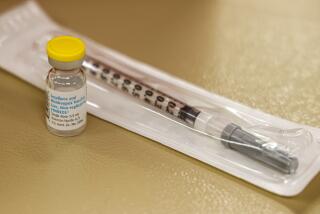Two doses -- instead of three -- might suffice for HPV vaccine
The HPV vaccine, approved in 2006, requires three shots over a six-month period -- a regimen that is inconvenient and costly. But a new study shows a two-dose vaccine may work as well.
The vaccine prevents infection from certain strains of the human papilloma virus, which can cause cervical cancer. It is considered revolutionary because it’s the first vaccine to prevent a type of cancer. (It was even a topic of Wednesday night’s Republican presidential candidates’ debate because of Texas Gov. Rick Perry’s proposal to mandate the vaccine in his state.)
The new study, published Thursday in the Journal of the National Cancer Institute, compared almost 6,000 women in Costa Rica who received three doses of the vaccine, 802 who received two doses and 384 who got one dose. The study used the vaccine Cervarix, which was approved for use in the United States shortly after the debut of Gardasil five years ago. Although all of the participants had intended to get three doses of vaccine, a portion were unable to complete the regimen for various reasons and thus became the two-dose and single-dose study arms.
After four years of follow-up, the levels of protection against the HPV strains 16 and 18 (common cancer-causing strains) were similar among the three groups. The authors of the paper, from the National Cancer Institute, said they were especially surprised that a single dose conferred protection.
It’s still unclear, however, whether a regimen of fewer than three doses will protect against HPV over a long period of time. And, until now, doctors will continue to recommend a three-dose regimen.
Return to Booster Shots blog.
twitter.com/LATShariRoan






